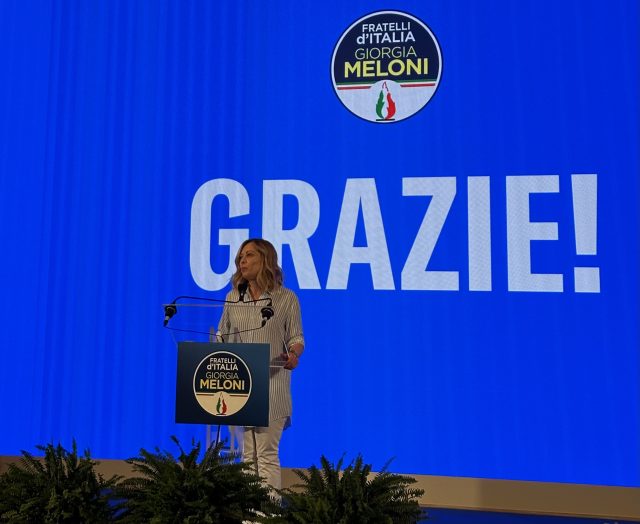
The night of Fratelli d’Italia lasts just 16 minutes. Sixty seconds to 2 am, and the unmistakable notes of “Ma il cielo è sempre più blu” by Rino Gaetano play over the sound system in the conference hall of the Hotel Parco dei Principi, the party’s headquarters for major electoral occasions. Journalists rush to figure out which entrance Giorgia Meloni, Prime Minister and top candidate in all constituencies, will emerge from.
“We met here almost two years ago and it was a beautiful night. This one, for me, is even more beautiful,” the thank you speech begins with a reference to when, from the same stage, she had commented on the percentages that in 2022 had led her to win the political elections. On that occasion, Fdi boasted just under 26%. After a year and eight months in government, her party continues to grow, nearing 29%. “This is the message from the Italians: keep going. With greater determination,” she says, looking for her sister Arianna, on the side of the stage, now head of the party’s political secretariat. In light of the results in the rest of Europe, she emphasizes her pride in being able to present herself “at the G7 and in Europe with the strongest government of all.” The reference is to what happened in France, where President Emmanuel Macron dissolved the parliament and called new elections for the upcoming June 30, in the midst of the Paris Olympics. Marine Le Pen and Jordan Bardella’s Rassemblement National obtained 32% of the votes, while the president’s party stopped at 14%. Europe has given a clear and unmistakable signal of what it wants to happen and what the change of pace should be. The Popular Party still has the majority, but the Conservatives are potentially the third group in the European Parliament. The right is there and stronger than ever in Europe.
In Meloni’s words, there is satisfaction with the allies’ numbers, but there are also jabs at those who oppose her. Without naming them, as was the case for much of the election campaign, regarding the 5 Star Movement that did not exceed 10%, she is curt: “The system is becoming bipolar again. It’s good news because there are worldviews that clash and on which citizens are asked to take a stand.”
The jab at Elly Schlein’s Pd, however, comes at the end, when the Mameli anthem has already been played. Meloni is about to leave the stage when she decides to return to the microphone: “They saw us coming but they couldn’t stop us.” Not even 10 minutes of speech and the Prime Minister has already exited through the door behind the stage. It’s 2:15 am, militants, parliamentarians, leaders, and staff of Fratelli d’Italia wave the party’s flags while “A mano a mano,” also by the singer born in Crotone, plays. Thus begins the celebration of the “most beautiful” night.
The festive atmosphere is palpable, but Meloni’s words also convey a clear vision for the future. “This is just the beginning of a path that will see Italy at the center of European decisions,” she affirms with conviction. The rightward shift of the European Union is a signal that she interprets as a confirmation of the ongoing change, a change she has helped shape and intends to be a protagonist of. The growth of conservative parties in Europe, according to Meloni, is not just a political victory but a reflection of a broader desire to return to traditional values and a more decisive governance.
The militants applaud, aware that the road will still be long and challenging, but confident in their leader’s guidance. As the celebration continues, Meloni retreats with her closest collaborators, already focused on the challenges that the new European political landscape will present. The most beautiful night is just the beginning of a new era for the Italian and European right.



 Subscribe
Subscribe